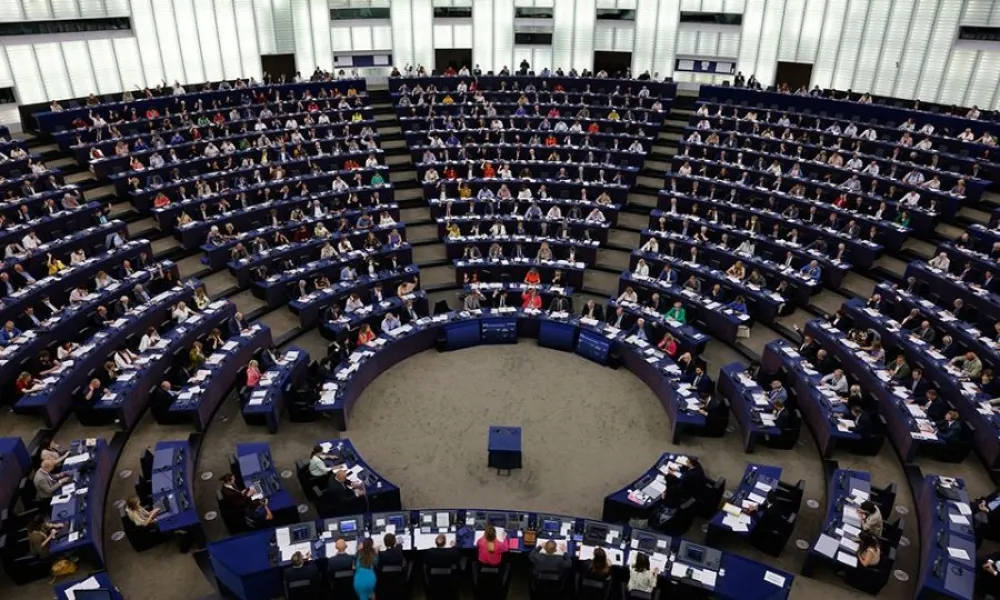In view of the journalistic award Daphne Caruana Galizia by the European Parliament as well as the announcement of the Sakharov Prize 2025 winner, CNA asked the six Cypriot MEPS for their position on the protection of journalists and freedom of press in the EU and accession candidates, as well as what the European Parliament is doing or should be doing about it.
“As a journalist and the European Parliament’s rapporteur for the directive against SLAPP, I know firsthand the pressures and threats journalists are faced with,” DISY and EPP MEP Loucas Fourlas said.
Daphne Caruana Galizia, he noted, “paid the search of truth with her life.”
Independent journalism is vital
Fourlas said that the directive against SLAPP is only the beginning. It includes specific preventive measures and ways of protection when journalists’ work is hindered,” he added.
He stressed that “the directive must be fully implemented, and there must be strict accountability for crimes such as Galizia’s assassination, independent media should be funded, whistleblowers should be supported, there must be mechanisms of legal and psychological support.”
“Media freedom is a non-negotiable criterion in order for a country to knock on the EU’s door for accession and it is a foundation of democracy,” he pointed out.
On his part, DISY and EPP MEP, Michalis Hadjipantela, said that the Daphne Caruana and Sakharov awards “showcase the role of independent journalism as the foundation of democracy and transparency.”
The EU, he noted, “must protect journalists from threats and attacks and ensure conditions of free expression, through the European Media Freedom Act and the anti-SLAPPs directive.”
Press freedom 'non-negotiable'
Hadjipantela assured that “the protection of journalists and freedom of press constitutes the foundation of our democracy and our EPP parliamentary group at the European Parliament places them as a key priority.”
This effort, he added, “will be continuous and must evolve to deal with new dangers against media brought about by time and technological evolution.”
Referring in particular to Cyprus, the MEP spoke of the need to “consolidate the journalistic profession, ensuring both professional safety as well as independence in their work.”
On candidate countries for EU accession, he noted that “ensuring press freedom should be a non-negotiable condition, with a clear political and institutional support from the EU.”
AKEL (GUE/NGL) MEP Giorgos Georgiou said on his part that “we have repeatedly stressed that the assassination of Daphne Galizia exposed in the most violent way the degree of breakdown, if not decomposition, of the rule of law in the EU. But also, of the threat journalists in Europe are faced with.”
Pluaralism and democracy
Freedom of press, Georgiou noted, “is non-negotiable and the EU, as a Union of values, must safeguard the protection of everyone who expose corruption and defend public interest.”
The Cypriot MEP added that “we have criticized the lack of action of institutions and we have called the European Parliament many times to vote on mandatory control mechanisms both for member states and candidate countries for accession.”
“The accession course cannot go forward if full respect of freedom of press, judicial independence and protection of journalists from political or financial pressures are not upheld,” Georgiou concluded.
DIKO and S&D MEP, Costas Mavrides ,said that “media freedom is enshrined in the EU Fundamental Rights Charter and the European Convention for Human Rights and this is not a theoretical matter but a key necessary component of democracy.”
The European Parliament, he noted, is a pioneer to ensuring media freedom and pluralism in the EU, given that it is necessary in quite a few member states.
Both his political group and personally, Mavrides said, "have significantly contributed through the European parliament in the adoption of the European Media Freedom Act, which put in place for the first time a single legislative framework at EU level, was put in effect in August and will be tested in practice, since it needs to be fully and correctly implemented by all member states.”
Referring to EU candidate countries, Mavrides said that “respecting freedom of press and the protection of journalists constitute a necessary condition and particularly Turkey is a poor example, since journalists are prosecuted by the government and are incarcerated merely for having a point of view.”
The European Parliament, he stressed, has “repeatedly strongly condemned such practices, but decisions on the accession process are taken by the Council and member states’ governments.”
'Unbearable pressure' on the media
On his part, ELAM (ECR) MEP, Geadis Geadi, said that “the protection of journalists and freedom of press in the EU, as well as candidate countries, is a non-negotiable condition, and something which should be taken for granted.”
Unfortunately, he added, “the truth is that most media do not operate in an ideal environment, with their members suffering unbearable pressures from outside, stuck and stifled within lines drawn by people above them.”
He also referred to the new regulation voted by the European Parliament in 2024 for the protection of journalists and freedom of press, adding that the EMFA is in full force already.
The great challenge, Geadi pointed out, is the transition from theory to practice in a way that the protection of journalists and safeguarding freedom of press in the EU as democratic fundamental pillars are not just written in regulations and legislation but are a self-evident reality across Europe.
“The situation with the protection of journalists usually reflects the level of democracy in our societies,” independent Cypriot MEP, Fidias Panayiotou, said.
The EU has undertaken good initiatives, such as the European Media Freedom Act for the protection of journalists, but on the other hand it has taken actions against journalism through hybrid sanctions against European citizens, some of whom for their journalistic activity, he added.
“While generally journalists in Europe enjoy a good level of protection, the EU has adopted certain policies which are against them and which I do not support,” he concluded.
CNA
